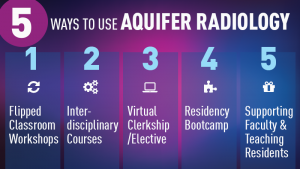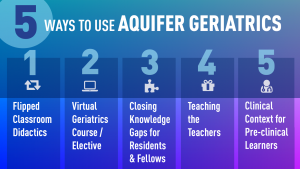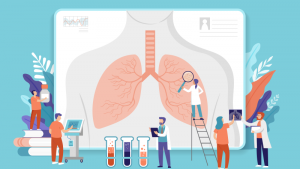Educator-to-Educator Tips & Strategies
Find out how your peers are making the most of Aquifer cases and teaching tools.
Find out how your peers are making the most of Aquifer cases and teaching tools.

WISE-OnCall is used by programs across medical and health professions education to help learners diagnose and manage clinical situations they are likely to encounter on clinical clerkships, advanced sub-internships, and during the transition to residency or practice. Here are some successful integration strategies that we’ve heard from faculty users…

Aquifer High Value Care, a free course available to all … Read more

WISE-OnCall is used by programs across medical and health professions education to help learners diagnose and manage clinical situations they are likely to encounter on clinical clerkships, advanced sub-internships, and during the transition to residency or practice. Here are some successful integration strategies that we’ve heard from faculty users…

WISE-OnCall is used by programs across medical and health professions education to help learners diagnose and manage clinical situations they are likely to encounter on clinical clerkships, advanced sub-internships, and during the transition to residency or practice. Here are some successful integration strategies that we’ve heard from faculty users…

WISE-OnCall is used by programs across medical and health professions education to help learners diagnose and manage clinical situations they are likely to encounter on clinical clerkships, advanced sub-internships, and during the transition to residency or practice. Here are some successful integration strategies that we’ve heard from faculty users…

Whether you’re searching for ways to engage students in virtual learning, revamping a stale lecture, or building a new didactic session, flipping the classroom around Aquifer cases is a powerful way to engage your students and help case-based learning stick. Check out different ways that medical educators are integrating Aquifer cases into their pedagogy…

In our 12-week pediatrics course for first-year PA students, we use Aquifer cases as a framework for four of our eight didactic sessions. Each Aquifer session includes an in-class lecture that covers the “don’t miss” diagnoses and difficult concepts for the topic area, followed by the students completing the related Aquifer case and the Aquifer Case Analysis Tool worksheet independently.

The 19 cases in Aquifer Radiology are designed to meet the needs of a wide range of learners and fit into many teaching modalities. Top radiology educators presented their successful strategies for integrating the cases in our recent webinar–find out what they shared…

The 27 cases in Aquifer Geriatrics are designed to meet the needs of a wide range of learners and fit into many teaching modalities. Top geriatrics educators from around the country presented their successful strategies for integrating the cases in our recent webinar–find out what they shared…

Diagnostic errors are a major source of morbidity and mortality in health care, and there is increasing focus on reducing diagnostic errors in medicine. Fitting these topics into your curriculum can be challenging. To help, I’d like to highlight strategies that educators have found successful using the cases and teaching tools included in Aquifer Diagnostic Excellence.

As the pandemic caused widespread disruption, Aquifer saw an unprecedented jump in the use of our cases–and many innovative ways to use the cases across curricula. Through our grant applications and many ongoing conversations with educators, we were able to identify trends and challenges and gather success stories and strategies to share.

As part of my fellowship research project, I rebuilt a didactic session in our Geriatrics rotation using the flipped classroom model, an Aquifer Geriatrics case, and a range of teaching techniques to create an engaging, student-centered session.

When the pandemic hit, Harvard Medical School called upon the radiology clerkship committee to provide a virtual clerkship. With one week of preparation, we constructed the 4-week clerkship around the 19 Aquifer Radiology modules and a combination of large group lectures and small group homerooms.

Aquifer cases can form the basis for a huge variety of classroom sessions that can be easily adapted for virtual learning. Here are some ideas to spark your creativity if you are designing your own activity. Suggested strategies include…